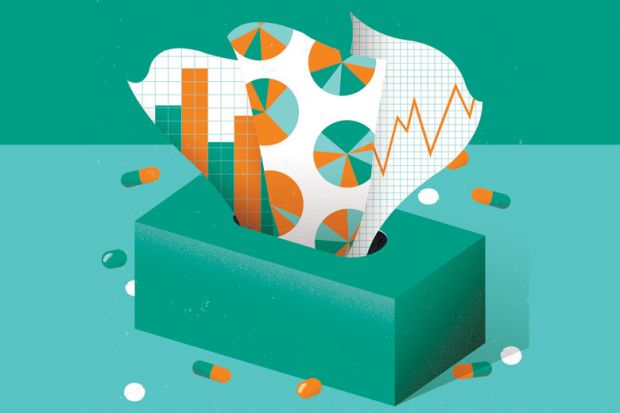Sometimes science can be personal. When my father, who was living in Greece at the time, was diagnosed with stage IV gastric cancer in 2007, I set out to find the best possible care for him. As is the case with many patients with advanced disease, drug therapy was his best course. So, after unsuccessful surgery in Greece, he came to the US for treatment.
I contacted the most prestigious cancer hospitals in the country and found that they all used different drugs in different treatment regimens to treat advanced gastric cancer. As both a son and a scientist, I was surprised to discover that there was no standard treatment – something I would later realise was true of many different kinds of late-stage cancers.
My family and I were therefore left without a good way to make treatment decisions. As a result, I was forced to do a kind of back-of-the-envelope calculation. Based on the small number of published findings I could locate, I plotted different drug combinations on a curve, seeking to discover the sweet spot between the estimated survival period given by the chemotherapy treatment and the expected toxicity of the treatment.
In other words, I wanted my father to have the longest possible amount of time with the best quality of life – a goal shared by many cancer patients and their doctors.
After much research, our family decided on the Massachusetts General Hospital in Boston. My father tolerated his treatment well. He lived for 24 months from his diagnosis – that’s 14 months longer than average.
After his death, my personal concern became a professional passion. My speciality is operations research. I work and teach in the field of analytics: the science of using data to build models that lead to decisions that add value to society.
There were 8 million deaths worldwide from cancer in 2012, and the World Health Organization expects there to be 13 million by 2030. Cancer, after all, is a common disease, striking 50 per cent of men and 30 per cent of women at some point in their lives.
A key goal of oncology research for advanced cancer is to identify novel chemotherapy regimens that yield better clinical outcomes than currently available treatments. This is difficult in part because of the vast number of drugs and potential combinations used in treatment. It is also difficult because it can cost between $10 million (£6.8 million) and $20 million to run a trial. However, there is evidence from other fields of medicine that machine learning can help in predicting medical outcomes. So we set out to build a database that could better predict clinical outcomes using the modern methods of analytics.
To perfect a science-based approach to the next generation of clinical trials, we first had to extract the most relevant data. Despite serious efforts in the medical community to use data-driven and evidence-based approaches to medicine, I realised that most of the choices about which trials to conduct were made on the basis of intuition.
To change this, I set out with my colleagues to first provide a descriptive kind of analysis: we needed to describe in concrete terms what was known about drug trials to date. We extracted the relevant information from more than 400 papers published between 1980 and 2013 and created a unique database that compares toxicity and survivability for those battling gastric cancer regarding a range of drugs and drug combinations. This in itself was a major advancement. No individual doctor, after all, could possibly know all the different outcomes of all the different trials conducted over a 20-year period.
Using our model, we can at least partially predict outcomes without performing actual trials. This allowed us to use a scientific approach to help doctors choose which new trials to conduct – of both individual drugs and drug combinations. For instance, in 2005 we proposed a set of 20 clinical trials that we believed would be most likely to increase survivability without excessive toxicity. Of those, 10 were conducted over the next decade. These increased survivability by an average of about four months. That is a statistically relevant increase given the way that cancer trials are evaluated, but, more importantly, four months is also a life-changing amount of extra time for someone suffering with the disease. I know that from my personal experience.
While our work to date has focused on gastric cancer, we believe that data-driven tools for leveraging clinical trials has widespread applications for many diseases that are treated by multiple drug therapies, including other types of cancer, cardiovascular disease, diabetes and high blood pressure.
There is an old saying that statistics are just stories with the tears wiped away. As a data scientist, my goal is to use these statistics to stop or at least postpone a few tears and a lot of wasted time and heartbreak. I’m hopeful for the future even as I remember my father’s bittersweet struggle.
Dimitris Bertsimas is Boeing professor of operations research and co-director of the Operations Research Center at the Massachusetts Institute of Technology. His paper “An Analytics Approach to Designing Clinical Trials for Cancer”, co-authored with Allison O’Hair, John Silberholz and Stephen Relyea, was awarded the William Pierskalla best paper award in healthcare for 2013. It was published in Management Science on 2 May 2016.
POSTSCRIPT:
Print headline: More data, fewer tears
Register to continue
Why register?
- Registration is free and only takes a moment
- Once registered, you can read 3 articles a month
- Sign up for our newsletter
Subscribe
Or subscribe for unlimited access to:
- Unlimited access to news, views, insights & reviews
- Digital editions
- Digital access to THE’s university and college rankings analysis
Already registered or a current subscriber? Login




